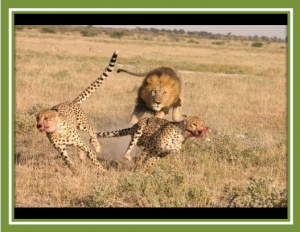News
Latest Lion Aid News
Lions get a break from bad publicity
Tuesday 10th December 2013

Even after 500,000 years of bullying, I just can’t stop doing it… There are some researchers who think lions are big bullies. They kill cheetahs and wild dogs for example, and are just plain naughty animals for causing such mayhem among sympatric predators. For cheetahs, Sarah Durant and co-authors had this to say in the 2004 edition of the journal Behavioral Ecology: “Cheetah cubs in the Serengeti suffer extraordinarily high mortality. A detailed behavioral study of radio-collared females showed that only 36% of cubs leave their lair at 2 months of age, and only 5% reach independence at 18 months. The chief source of this mortality is predation by lions (Panthera leo), which accounts for nearly 75% of known cub mortality.” Sarah in 2011 even went so far as to question the need to vaccinate domestic dogs around the Serengeti against Canine Distemper Virus: “In particular, lethal CDV outbreaks have the potential to cause a sudden drop in lion numbers, which could allow cheetahs to increase its population size. We thus expect that an effective vaccination campaign could have positive impacts on the lion population size, by reducing or suppressing the chance of a lethal CDV outbreak, and negative impacts on cheetahs.” I expressed my views on this highly controversial attitude here. From African wild dog researchers we read this published in the journal Ethology in 2011: “Lions directly limit wild dogs by stealing their kills, killing pups or even adults. Indeed, lions may be the single greatest cause of natural mortality for wild dogs, with lion predation accounting for 47% of known-cause adult wild dog deaths in the Moremi Game Reserve.” It has always amazed me that lions, wild dogs, cheetahs and other large predators managed to sort out their differences for hundreds of thousands of years before researchers came along to post these numbers. And actually, what do these researchers want to do about it? Remove lions? Luckily, Gus Mills recently came along to bring some sense to this nonsense. Gus has a very long pedigree of carnivore research in South Africa, and while I might not always see eye to eye with him on lion conservation issues, his authoritative voice is based on long experience. Gus had this to say in a 2013 edition of the Journal of Zoology: “Cheetah cub survival on the Serengeti Plains (SP) was found to be exceptionally low, because of high predation rates, thought to be especially by lions. These results have contributed to the perception that cheetah cubs are particularly vulnerable to predation, and that areas with large carnivores may not be suitable for cheetah conservation. Here we show that survival of cheetah cubs in the Kgalagadi Transfrontier Park was seven times higher than on the SP and, although predation was the most common form of mortality, lions were not found to be involved. Moreover, we suggest that scrutiny of the Serengeti data does not unequivocally prove the dominance of lions as predators of cheetah cubs there. We discuss these findings in the context of cheetah conservation, suggesting that further research on coexistence between cheetahs and other carnivores should receive attention and that the high mortality rates of cubs found on the SP may not be as widespread as is commonly believed.” Thank you Gus Mills for setting the record straight. Picture credit: http://binged.it/ICEJbg If you have not already signed up to our mailing list, you can add your name here and keep up to date with our ongoing work and, most importantly, DONATE to support our continuing work to conserve the remaining fragile lion populations and bring you the latest information. Thank you Categories: Events/Fundraising, Traditional Medicine, Domesticating Animals |
Posted by Chris Macsween at 14:15
No comments have been posted yet.
Add a new comment
Existing user
New user sign up



